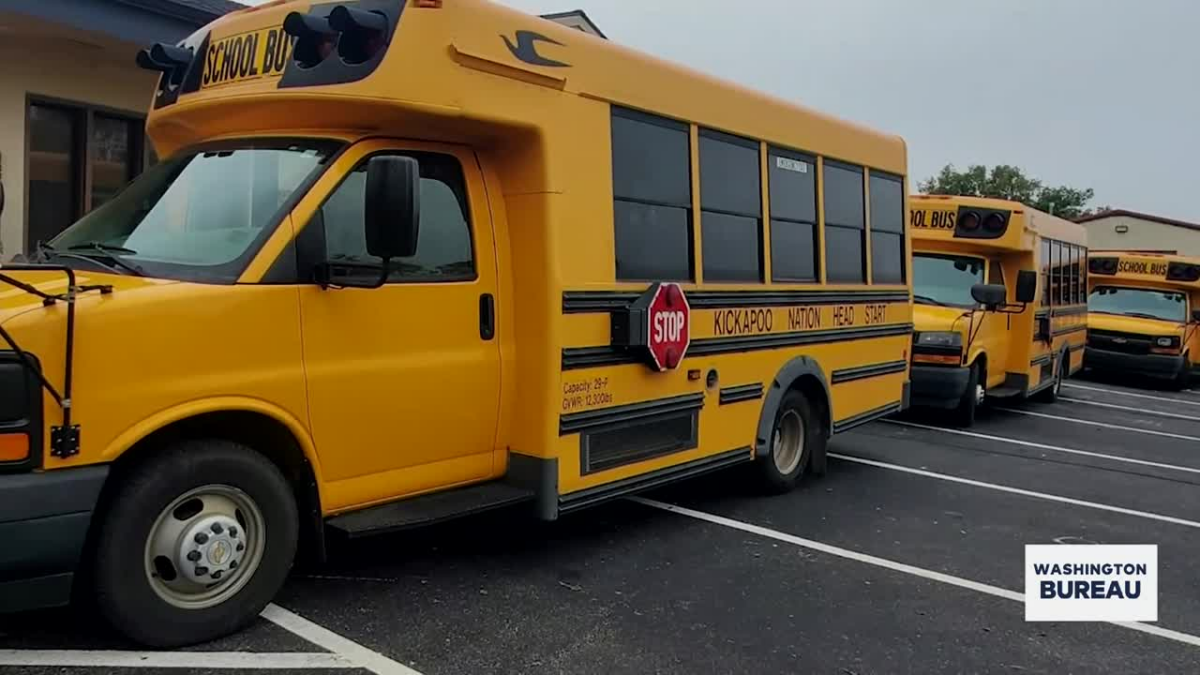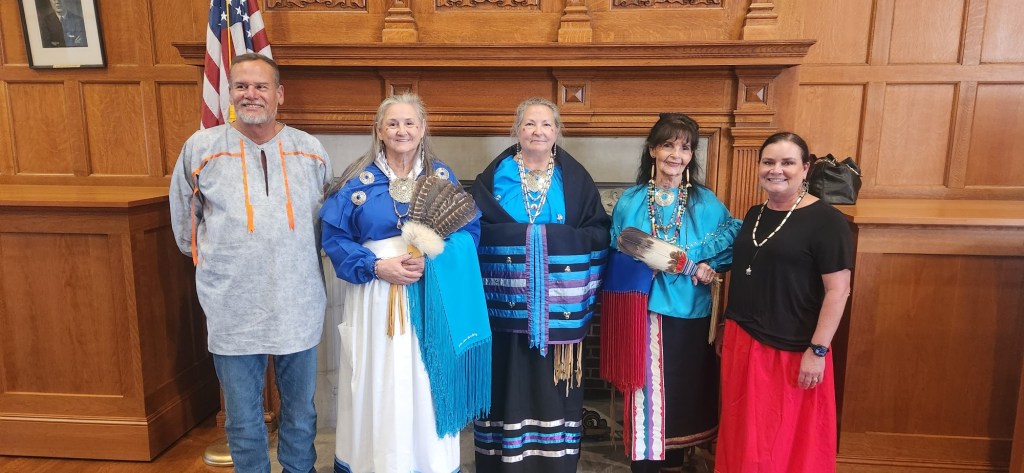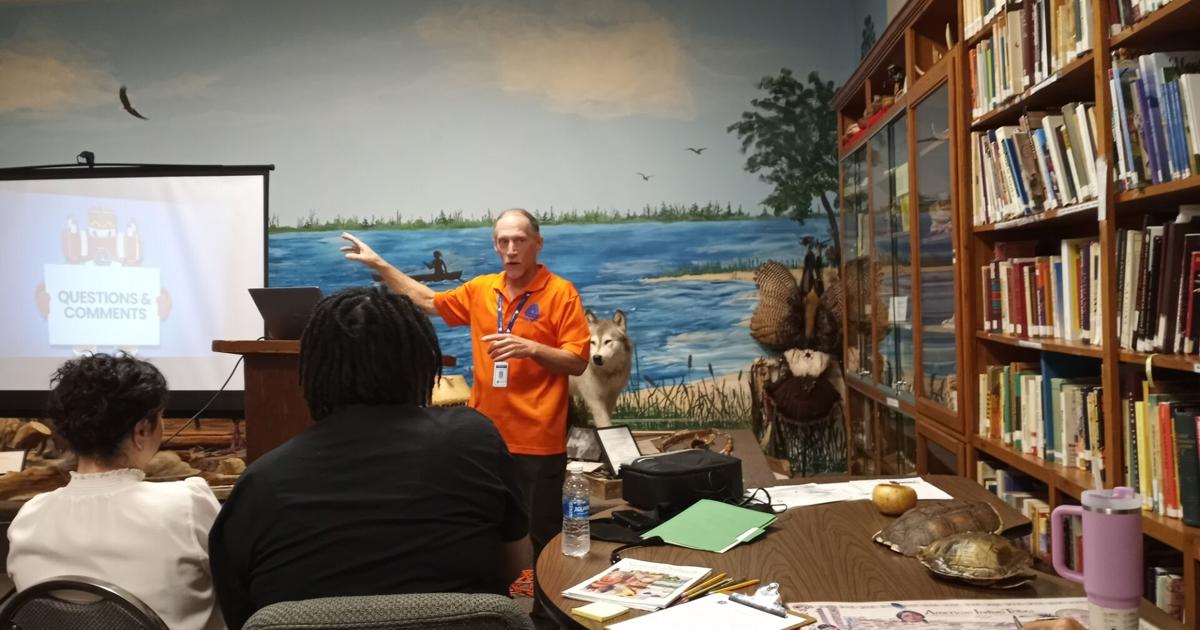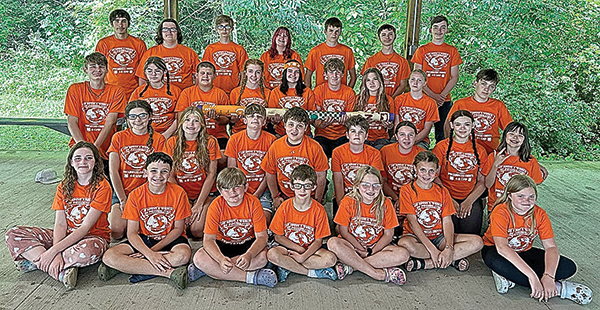In this period of government and fiscal uncertainty, directors of Oklahoma Tribal Head Start programs were in Washington, D.C. last week to advocate on the Hill for continued funding. Among those in attendance were Jayme Trevino, Director of the Kickapoo Tribe’s Head Start program in McLoud, and Monica Fisher, Director of the Delaware Tribe of Indians’ Lenape Early Learning Center Head Start in Bartlesville. Both programs serve 60 children (and their families). In total, Tribal Head Start programs serve close to 3,000 children in Oklahoma. Only Arizona has a higher number of children enrolled in Tribal Head Starts.
Fisher: “What’s great about the Early Head Start and Head Start programs is we create partnerships with our families in our communities, and so we take a whole child and whole family approach to serving the family and ensuring that we’re setting families up for success from the very beginning.”
Trevino: “We are, I like to say, the baseline, the foundation. Our teachers are specialized in the areas that they teach — they come in with bachelor degrees. We want to be recognized as a professional institute. And the dollars really help…they are very much worth the investment.”
For FY 2026, the White House budget request maintains funding for Head Start at its FY 2025 level of $12.272 billion. The House and Senate appropriations bills also propose funding at or close to this amount:
- White House Request: Proposes to keep Head Start funding at the same level as FY 2025.
- House Proposal: Also includes level funding for Head Start at $12.272 billion.
- Senate Proposal: Includes an increase of $85 million, bringing the proposed total to $12.36 billion.
The HHS Budget proposal says this about the Head Start program:
“The Head Start Program provides grants to local public and private non-profit and for-profit agencies. The grants will provide early learning and…


 A Golden Eagle feather held by a Native American Lenape or member the Delaware Tribe of Oklahoma. (BILL RETTEW/MEDIANEWS GROUP)
A Golden Eagle feather held by a Native American Lenape or member the Delaware Tribe of Oklahoma. (BILL RETTEW/MEDIANEWS GROUP)  A beautiful hand-made outfit worn by the Lenape of Oklahoma. (BILL RETTEW/MEDIANEWS GROUP)
A beautiful hand-made outfit worn by the Lenape of Oklahoma. (BILL RETTEW/MEDIANEWS GROUP)  The Lenape of Oklahoma wearing a traditional outfit at West Chester University. (BILL RETTEW/MEDIANEWS GROUP)
The Lenape of Oklahoma wearing a traditional outfit at West Chester University. (BILL RETTEW/MEDIANEWS GROUP) 



 Installation view of Indigenous Identities: Here, Now & Always at the Zimmerli Art Museum. Photo Credit: McKay Imaging Photography
Installation view of Indigenous Identities: Here, Now & Always at the Zimmerli Art Museum. Photo Credit: McKay Imaging Photography







 Seneca – front row, from left: Brayden Diller, Arabella Wade, Savannah Barnes, Jameson Slifer, Ryan Burns, Aria Nelson, Lane Wilfong and Michael Friel. Second row: Boone Cassell, Mia Valach, Savana Sharp, Jaryd Wilfong, Lillie Cassell, Mackenzie White, Amelia Rogers and Adalyn Beverage. Back row: Makiya Burns, Riley Hamons, Sienna Hamons, Layla Highland, Hannah Burks, Natalie Irvine, Konrad Lowe, Grayson Barlow, Caleb Ritter, Richard White, Jaxon Cassell, Kylor Brock and Victor Dean.
Seneca – front row, from left: Brayden Diller, Arabella Wade, Savannah Barnes, Jameson Slifer, Ryan Burns, Aria Nelson, Lane Wilfong and Michael Friel. Second row: Boone Cassell, Mia Valach, Savana Sharp, Jaryd Wilfong, Lillie Cassell, Mackenzie White, Amelia Rogers and Adalyn Beverage. Back row: Makiya Burns, Riley Hamons, Sienna Hamons, Layla Highland, Hannah Burks, Natalie Irvine, Konrad Lowe, Grayson Barlow, Caleb Ritter, Richard White, Jaxon Cassell, Kylor Brock and Victor Dean.  Cherokee – front row, from left: Ayla Fanning, Sullivan Seldomridge, Kysor Calhoun, Andrew Herold, Daisy Hefner, Alida McNeel and Brinley McLaughlin. Second row: Elizabeth Friel, Chloe Annett, William Shifflett, Jesse McNabb, Rufus Morgan, Kendyl Hummel, Rowan Lindbloom and Ava Robinson. Third row: Karis Lowe, Laelah Clendenen, Levi Hill, Ramona Hardy, Andrea Alderman, Silas Dean, Sydney Slifer, Makenna Marsh and Ailec Lindbloom-Robinson. Back row: Ezra Bond, Colton Cassell, Tyler Friel, Bayla Plaugher, George Shifflett, Joseph McClure, William Lindbloom.
Cherokee – front row, from left: Ayla Fanning, Sullivan Seldomridge, Kysor Calhoun, Andrew Herold, Daisy Hefner, Alida McNeel and Brinley McLaughlin. Second row: Elizabeth Friel, Chloe Annett, William Shifflett, Jesse McNabb, Rufus Morgan, Kendyl Hummel, Rowan Lindbloom and Ava Robinson. Third row: Karis Lowe, Laelah Clendenen, Levi Hill, Ramona Hardy, Andrea Alderman, Silas Dean, Sydney Slifer, Makenna Marsh and Ailec Lindbloom-Robinson. Back row: Ezra Bond, Colton Cassell, Tyler Friel, Bayla Plaugher, George Shifflett, Joseph McClure, William Lindbloom. Mingo – front row, from left: Jonah Mann, Natalie Sisler, Emma Pugh, Rylee Calhoun, Elijah Keatley, Blake Alderman, Anthony Burdette and Val Phillips. Second row: Bentlee Gladwell, Canden Lambert, Kya Arbogast, Mason Markl, Lydia Taylor, Jace West, Shelldon Maitland and Aubrey Evans. Third row: James Monico, Ben Workman, Erin Rider, Kirsten Friel, Caitlin Mallow, Eden Smith, Grace Beverage and Melinda Beverage. Back row: Abigail Taylor, Katelyn Stull, AJ Bauserman, Riley Pollack, Rya Barlow, Morgan Smith, Rachel Felton, Riyan Gladwell and Cora Baldwin.
Mingo – front row, from left: Jonah Mann, Natalie Sisler, Emma Pugh, Rylee Calhoun, Elijah Keatley, Blake Alderman, Anthony Burdette and Val Phillips. Second row: Bentlee Gladwell, Canden Lambert, Kya Arbogast, Mason Markl, Lydia Taylor, Jace West, Shelldon Maitland and Aubrey Evans. Third row: James Monico, Ben Workman, Erin Rider, Kirsten Friel, Caitlin Mallow, Eden Smith, Grace Beverage and Melinda Beverage. Back row: Abigail Taylor, Katelyn Stull, AJ Bauserman, Riley Pollack, Rya Barlow, Morgan Smith, Rachel Felton, Riyan Gladwell and Cora Baldwin.  Delaware – front row, from left: Ariana Woody, Evelyn Simmons, Jerzie Jackson, Simon Scotchie, Annabel Swan, Owen Boggs, Owen Sattler and Bianca Arnold. Second row: Elizabeth McClure, Kaya Eves, Isabella McClure, Diamond Owens, Madelynne Wims, Aliza Hayes, Brynn Clutter and Weston Cassell. Third row: Luke Taylor, Adalee Hayes, Ahna Valach, Luke Gainer, RT Hill,…
Delaware – front row, from left: Ariana Woody, Evelyn Simmons, Jerzie Jackson, Simon Scotchie, Annabel Swan, Owen Boggs, Owen Sattler and Bianca Arnold. Second row: Elizabeth McClure, Kaya Eves, Isabella McClure, Diamond Owens, Madelynne Wims, Aliza Hayes, Brynn Clutter and Weston Cassell. Third row: Luke Taylor, Adalee Hayes, Ahna Valach, Luke Gainer, RT Hill,…